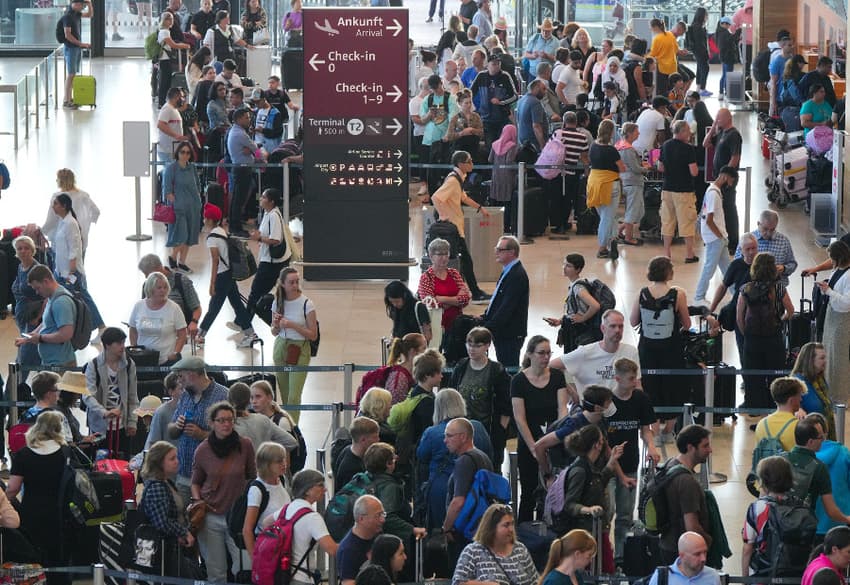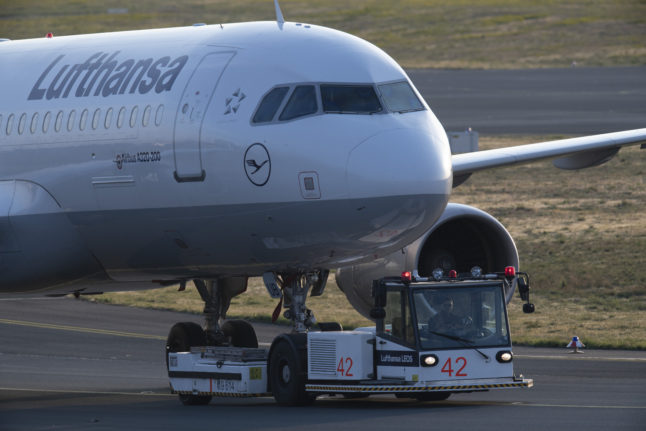Can German airports dodge chaos this year amid summer holidays?

The start of summer holidays in several German states means absolute peak traffic for airports. Will they avoid the chaos they experienced last summer?
Airline passengers in Germany might fear a repeat of last summer as they depart for summer holidays, which have different start and end dates in all 16 states.
Perhaps they remember the mountains of baggage that were transported too late or not at all, gruelling queues, overloaded phone hotlines, delayed or cancelled flights.
The staff shortages and general chaos led to the German government stepping in to ease the process of allowing airlines to hire temporary workers from abroad quickly.
READ ALSO: Flight chaos: How Germany wants to relax red tape to recruit foreign workers
Their worries come as passenger traffic is on the rise. For the first time in almost four years, there were three days with more than 200,000 passengers at Frankfurt’s airport in June - just 40,000 away from the all-time record set in June 2019.
The Berlin-Brandenburg BER airport also counted a near record 800,000 travellers on Friday, the day after school holidays kicked off in the capital.
READ ALSO: Why are flights to and from Germany so expensive at the moment?
Smooth start
But many airports are reporting a smoother than expected summer, despite being understaffed since the pandemic.
"We had a very well-planned and relaxed start to the summer holidays on Friday," a spokesperson for the Berlin-Brandenburg airport company (FBB) told German News agency DPA. "All passengers were well prepared and our service providers at the airport were well positioned.
Over the entire summer holidays, BER operators expect around 3.5 million travellers - around half a million more people than a year ago.
For the airlines, meanwhile, the summer travel season remains a tense time.
"It remains a challenge and you can't rule out another chaos at the airports," Johan Lundgren, CEO of British budget airline Easyjet, told FAZ on Saturday.
"There are 10 to 15 percent more European flights than in 2022 and at the same time capacity restrictions continue at some airports, among other things because of staff shortages. This is an explosive mixture."
Measures for smoother flights
Despite the tight staffing situation, other German airports and airlines are confident that they can avoid the chaos of last year.
"The generally orderly operating procedure in the first half of the year makes us cautiously optimistic for Frankfurt and shows that the numerous measures taken are taking effect,” Frankfurt's airport CEO Stefan Schulte told DPA.
Germany’s largest carrier Lufthansa says its flights are significantly more stable and punctual than last year. More than 1,000 new people have been hired for the company's own operations and automated processes have been advanced, reported airline CEO Jens Ritter.
The airline hit the headlines after embarking on a major job-cutting programme, axing thousands of jobs during the pandemic, despite bailouts from the government.
READ ALSO: Germany's Lufthansa continues to recover amid travel boom

A Lufthansa plane takes off from Frankfurt in April 2021. Photo: picture alliance/dpa | Boris Roessler
Special attention is also being paid to starting the first flight in the morning as punctually as possible in order to avoid delays throughout the entire flight, airline bosses said.
In order to keep the flight schedule stable, the hourly cap on the maximum number of flights was lowered in consultation with air traffic control.
In both Munich and Frankfurt, new CT scanners speed up passenger and hand luggage checks, and self-check-in via smartphone is becoming more and more standard.
Airport operator Fraport has also been organising the deployment of personnel at the control lanes itself since the beginning of the year.
Tips for a smoother check-in
Passengers can further contribute to a smooth process themselves, says Fraport manager Alexander Laukenmann. Digital check-in, baggage drop-off the evening before or time slots at the security checkpoints that can be booked are the most important offers.
Everyone should also inform themselves about what absolutely belongs in their hand luggage (such as batteries) and what needs to be separated (liquids, electronics).
Those who need, or prefer to, check in at the counter should not arrive too early at the airport, said Laukenmann.
"Don't be in the terminals earlier than 2.5 hours,” he warned. “The check-in counters are not yet open then and you end up with unnecessary waiting times that could be avoided. For guests who only bring hand luggage, two hours before departure is quite sufficient."
Despite stormy weather conditions and the two-week-long major NATO Air Defender drill, there were fewer delays at German airports in June than in the same month last year, reported the European air traffic control organisation Eurocontrol in Brussels.
READ ALSO: What you need to know about NATO's German-led record air force drill
Not an air traffic hot spot
As with the previous year, air traffic in Germany remains lower than in other European countries.
Domestic flights in Germany are still half of what they were pre-pandemic and many low-cost airlines are concentrating their efforts elsewhere.
Irish budget airline Ryanair, for example, is currently focusing on Italy, Spain, Poland and Albania, where lower access costs and fees are attractive.
But that's positive news from an environmental standpoint: CO2 emissions from air traffic in Germany are still 14.3 percent below the July 2019 figure, according to Eurocontrol.
The industry association BDL forecasted that passenger numbers at German airports would reach 85 percent of the pre-crisis levels, while the rest of Europe will see the same traffic as in 2019.
European controllers are again directing almost as many flights through war-tightened airspace on individual days as they did in 2019, with the pre-Corona peak of more than 37,000 flights on June 28, 2019 only around 3,000 flights a day from being reached again.
Comments
See Also
Airline passengers in Germany might fear a repeat of last summer as they depart for summer holidays, which have different start and end dates in all 16 states.
Perhaps they remember the mountains of baggage that were transported too late or not at all, gruelling queues, overloaded phone hotlines, delayed or cancelled flights.
The staff shortages and general chaos led to the German government stepping in to ease the process of allowing airlines to hire temporary workers from abroad quickly.
READ ALSO: Flight chaos: How Germany wants to relax red tape to recruit foreign workers
Their worries come as passenger traffic is on the rise. For the first time in almost four years, there were three days with more than 200,000 passengers at Frankfurt’s airport in June - just 40,000 away from the all-time record set in June 2019.
The Berlin-Brandenburg BER airport also counted a near record 800,000 travellers on Friday, the day after school holidays kicked off in the capital.
READ ALSO: Why are flights to and from Germany so expensive at the moment?
Smooth start
But many airports are reporting a smoother than expected summer, despite being understaffed since the pandemic.
"We had a very well-planned and relaxed start to the summer holidays on Friday," a spokesperson for the Berlin-Brandenburg airport company (FBB) told German News agency DPA. "All passengers were well prepared and our service providers at the airport were well positioned.
Over the entire summer holidays, BER operators expect around 3.5 million travellers - around half a million more people than a year ago.
For the airlines, meanwhile, the summer travel season remains a tense time.
"It remains a challenge and you can't rule out another chaos at the airports," Johan Lundgren, CEO of British budget airline Easyjet, told FAZ on Saturday.
"There are 10 to 15 percent more European flights than in 2022 and at the same time capacity restrictions continue at some airports, among other things because of staff shortages. This is an explosive mixture."
Measures for smoother flights
Despite the tight staffing situation, other German airports and airlines are confident that they can avoid the chaos of last year.
"The generally orderly operating procedure in the first half of the year makes us cautiously optimistic for Frankfurt and shows that the numerous measures taken are taking effect,” Frankfurt's airport CEO Stefan Schulte told DPA.
Germany’s largest carrier Lufthansa says its flights are significantly more stable and punctual than last year. More than 1,000 new people have been hired for the company's own operations and automated processes have been advanced, reported airline CEO Jens Ritter.
The airline hit the headlines after embarking on a major job-cutting programme, axing thousands of jobs during the pandemic, despite bailouts from the government.
READ ALSO: Germany's Lufthansa continues to recover amid travel boom

Special attention is also being paid to starting the first flight in the morning as punctually as possible in order to avoid delays throughout the entire flight, airline bosses said.
In order to keep the flight schedule stable, the hourly cap on the maximum number of flights was lowered in consultation with air traffic control.
In both Munich and Frankfurt, new CT scanners speed up passenger and hand luggage checks, and self-check-in via smartphone is becoming more and more standard.
Airport operator Fraport has also been organising the deployment of personnel at the control lanes itself since the beginning of the year.
Tips for a smoother check-in
Passengers can further contribute to a smooth process themselves, says Fraport manager Alexander Laukenmann. Digital check-in, baggage drop-off the evening before or time slots at the security checkpoints that can be booked are the most important offers.
Everyone should also inform themselves about what absolutely belongs in their hand luggage (such as batteries) and what needs to be separated (liquids, electronics).
Those who need, or prefer to, check in at the counter should not arrive too early at the airport, said Laukenmann.
"Don't be in the terminals earlier than 2.5 hours,” he warned. “The check-in counters are not yet open then and you end up with unnecessary waiting times that could be avoided. For guests who only bring hand luggage, two hours before departure is quite sufficient."
Despite stormy weather conditions and the two-week-long major NATO Air Defender drill, there were fewer delays at German airports in June than in the same month last year, reported the European air traffic control organisation Eurocontrol in Brussels.
READ ALSO: What you need to know about NATO's German-led record air force drill
Not an air traffic hot spot
As with the previous year, air traffic in Germany remains lower than in other European countries.
Domestic flights in Germany are still half of what they were pre-pandemic and many low-cost airlines are concentrating their efforts elsewhere.
Irish budget airline Ryanair, for example, is currently focusing on Italy, Spain, Poland and Albania, where lower access costs and fees are attractive.
But that's positive news from an environmental standpoint: CO2 emissions from air traffic in Germany are still 14.3 percent below the July 2019 figure, according to Eurocontrol.
The industry association BDL forecasted that passenger numbers at German airports would reach 85 percent of the pre-crisis levels, while the rest of Europe will see the same traffic as in 2019.
European controllers are again directing almost as many flights through war-tightened airspace on individual days as they did in 2019, with the pre-Corona peak of more than 37,000 flights on June 28, 2019 only around 3,000 flights a day from being reached again.
Join the conversation in our comments section below. Share your own views and experience and if you have a question or suggestion for our journalists then email us at [email protected].
Please keep comments civil, constructive and on topic – and make sure to read our terms of use before getting involved.
Please log in here to leave a comment.